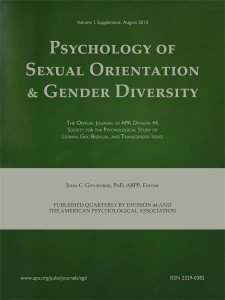 A report released recently by the Psychology of Sexual Orientation and Gender Diversity attempts to show that at least one in ten gay men who seek out the sexual company of others on Craigslist do so in search of non-gay identifying men (NGI) which includes men commonly referred to as being on the ‘down-low,’ married men, bisexual men and men who describe themselves as straight but curious. The implications, the authors announced, could have important consequences for the study of the sexual habits and practices of its sexual participants.
A report released recently by the Psychology of Sexual Orientation and Gender Diversity attempts to show that at least one in ten gay men who seek out the sexual company of others on Craigslist do so in search of non-gay identifying men (NGI) which includes men commonly referred to as being on the ‘down-low,’ married men, bisexual men and men who describe themselves as straight but curious. The implications, the authors announced, could have important consequences for the study of the sexual habits and practices of its sexual participants.
Eric Schrimshaw, PhD, at Columbia University’s Mailman School of Public Health and Martin J. Downing, Jr., PhD, of the National Development and Research Institutes started with 1,200 personal ads on Craigslist because, in their own words, “[I]t is publicly accessible, highly trafficked, free-of-charge, and widely used by gay, NGI men seeking men, or men who have sex with men and women to find sexual partners. From there, they narrowed down their analysis to 282 ads. (No mention was made in the study of whether or not their results were duplicated on sites with similar attributes like Grindr, Scruff, etc.)
What the researchers concluded was:
“Only a small number of ads by NGI-seeking men mentioned safe sex or condom use. The analysis revealed that men seeking NGI partners were significantly less likely to mention that they wanted to have safer sex/use condoms (15% vs. 33%) and were more likely (66% vs. 42%) to omit mention of condoms or safer sex in their advertisements. “This suggests that these men are more likely to be looking for and willing to engage in sex without a condom which may place them at greater risk for HIV/STI transmission than men who are not seeking non-gay-identified male partners,” said Dr. Schrimshaw, who is assistant professor of Sociomedical Sciences at the Mailman School of Public Health.
The results, while scant in their ubiquity, do seem to show that gay men seeking NGI men are more likely to engage in risky behavior but may help create strategies for public officials to successfully address the changing landscape of sexual mores that have defined the queer community since its inception.











